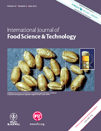
INTERNATIONAL JOURNAL OF FOOD SCIENCE AND TECHNOLOGY
Scope & Guideline
Innovative Discoveries for a Healthier Tomorrow
Introduction
Aims and Scopes
- Food Processing and Preservation Techniques:
Research focusing on various methods to improve food safety, shelf-life, and quality, including thermal and non-thermal processing, preservation technologies, and novel food processing approaches. - Nutritional and Functional Food Development:
Studies that investigate the nutritional components of food, the development of functional foods, and the enhancement of health benefits through ingredient modifications and processing. - Food Quality and Safety:
Research dedicated to assessing the quality attributes of food products, including sensory evaluation, microbiological safety, and the impact of processing on food quality. - Emerging Ingredients and Technologies:
Exploration of novel food ingredients, such as plant-based proteins and bioactive compounds, and the application of innovative technologies like nanotechnology and 3D food printing in food development. - Consumer Acceptance and Sensory Analysis:
Studies examining consumer perceptions, sensory attributes, and acceptance of food products, including the impact of ingredients and processing methods on taste and overall product appeal.
Trending and Emerging
- Plant-Based and Alternative Proteins:
There is a marked increase in research focusing on plant-based proteins and alternative sources of nutrition, driven by consumer demand for sustainable and health-oriented food options. - Innovative Food Packaging Solutions:
Emerging studies on biodegradable and active packaging systems, including the use of nanotechnology and bioactive compounds, are trending as researchers seek sustainable solutions to enhance food preservation. - Functional Foods and Nutraceuticals:
Research exploring the health benefits of functional foods and nutraceuticals is on the rise, with a focus on bioactive compounds and their implications for disease prevention and health promotion. - Food Waste Valorisation:
The trend towards sustainability is evident in the increasing number of studies aimed at valorising food waste and by-products for the development of novel food products and ingredients. - Smart and Non-Thermal Processing Technologies:
Innovations in processing technologies, such as cold plasma, high hydrostatic pressure, and pulsed electric fields, are becoming more prevalent, reflecting a shift towards methods that preserve food quality while ensuring safety.
Declining or Waning
- Traditional Food Processing Methods:
Research on conventional food processing techniques has become less frequent as there is a growing emphasis on innovative and non-thermal methods which promise enhanced food quality and safety. - Focus on Animal-Based Ingredients:
The increasing interest in plant-based diets and alternative proteins has led to a decline in publications centered around traditional animal-based ingredients, as researchers explore more sustainable options. - Single-Dimensional Nutritional Studies:
There is a noticeable decrease in studies focusing solely on basic nutritional composition, as the field shifts towards comprehensive analyses that consider bioactivity, health implications, and synergistic effects of food components. - Chemical Additives and Preservatives:
Research on synthetic chemical additives and preservatives has waned, with a growing preference for natural, clean-label alternatives and biopreservation methods gaining traction. - Conventional Sensory Evaluation Methods:
The use of traditional sensory evaluation methods is declining as researchers increasingly adopt advanced techniques that incorporate technology and analytics to assess consumer preferences.
Similar Journals
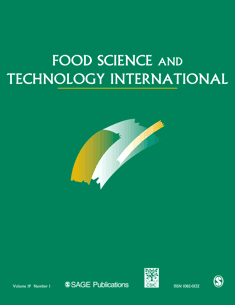
FOOD SCIENCE AND TECHNOLOGY INTERNATIONAL
Elevating the discourse in food technology and safety.FOOD SCIENCE AND TECHNOLOGY INTERNATIONAL, published by SAGE Publications Ltd, is a premier journal in the fields of food science and technology, serving as a crucial platform for the dissemination of innovative research and practical applications from 1995 through to 2024. With an impact factor reflecting its significant standing—ranking in the Q2 quartile for Chemical Engineering, Food Science, and Industrial and Manufacturing Engineering—this journal plays an instrumental role in advancing the interdisciplinary study of food systems. Researchers, professionals, and students can access high-quality contributions that address the latest developments and trends in food technology, safety, and processing. Located in the United States, FOOD SCIENCE AND TECHNOLOGY INTERNATIONAL also boasts commendable Scopus rankings, ensuring its articles are both relevant and widely cited within the academic community. As a vital resource for anyone engaged in food science research, этот журнал fosters knowledge sharing and innovation in the ever-evolving landscape of food technology.
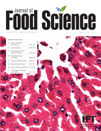
JOURNAL OF FOOD SCIENCE
Uncovering the Secrets of Food Science ExcellenceJOURNAL OF FOOD SCIENCE, published by Wiley, is a premier journal dedicated to advancing the field of food science, bridging the gap between fundamental research and practical application. With an impressive impact factor reflecting its authoritative status, the journal is ranked in the Q1 quartile for Food Science in 2023 and boasts a Scopus ranking of #71 out of 389, placing it in the 81st percentile within Agricultural and Biological Sciences. First launched in 1936, the journal continues to serve as an essential platform for researchers, professionals, and students to disseminate innovative studies and reviews that address critical issues in food quality, safety, and technology. While not currently offering open access, its rigorous peer-review process ensures the dissemination of high-quality and impactful research. Researchers engaged in the vital disciplines of food science will find this journal indispensable for keeping abreast of cutting-edge developments in the field.
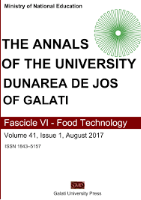
Annals of the University Dunarea de Jos of Galati, Fascicle VI-Food Technology
Exploring the Frontiers of Food TechnologyAnnals of the University Dunarea de Jos of Galati, Fascicle VI-Food Technology is a distinguished academic journal published by GALATI UNIV PRESS, dedicated to advancing knowledge in the field of food technology. With an open access format since 2007, this journal enhances accessibility to research findings and facilitates the dissemination of innovative ideas among researchers, professionals, and students worldwide. The journal holds a noteworthy position in its category, boasting a 2023 Q3 ranking in both Food Science and Industrial and Manufacturing Engineering, indicating its relevance and contribution to these critical fields. As it converges years of publication from 2012 to 2023, it encapsulates an evolving body of knowledge that reflects the latest advancements and research trends. Although it may not yet have a defined HIndex, its presence in Scopus with ranks of #253 in Industrial and Manufacturing Engineering and #278 in Food Science underscores its emerging impact. This journal is particularly significant for those engaged in research related to food technology and engineering, facilitating dialogue and collaboration within the community while addressing pressing challenges and innovations in food processing and safety. With its commitment to quality research, Annals of the University Dunarea de Jos of Galati serves as an essential resource for fostering knowledge and promoting scientific discussion.

International Food Research Journal
Unveiling Breakthroughs in Food Science and TechnologyThe International Food Research Journal, published by UNIV PUTRA MALAYSIA PRESS, serves as a pivotal platform for disseminating innovative research within the field of food science. With an ISSN of 1985-4668 and an E-ISSN of 2231-7546, the journal has successfully established its presence since its inception in 2007, converging its findings through 2024. This esteemed journal holds a Q3 ranking in Food Science, illustrating its valuable contributions to the field as demonstrated by its Scopus rank of 276 out of 389, placing it in the 29th percentile among its peers in Agricultural and Biological Sciences. Although it operates under a traditional publishing model, its academic integrity and focus on high-quality research ensure that it remains a vital resource for researchers, professionals, and students eager to explore advances in food technology, nutrition, and safety. By encouraging interdisciplinary collaboration and critical dialogue, the International Food Research Journal plays an essential role in shaping the future of food science research.

Ukrainian Food Journal
Connecting researchers to transform food systems.Ukrainian Food Journal is an esteemed open-access journal dedicated to advancing the field of food science and biochemistry. Established in 2012 and published by the National University of Food Technologies in Ukraine, the journal serves as a vital platform for researchers and professionals to disseminate their findings on food technology, safety, and nutritional biochemistry. With an ISSN of 2304-974X and E-ISSN 2313-5891, it offers a wealth of knowledge to its readers, promoting innovation and collaboration within the industry. While currently categorized within the Q4 quartile of biochemistry and the Q3 quartile of food science, the journal is progressively gaining recognition, reflecting a commitment to quality research in a competitive field. The journal is indexed in Scopus, ranking #271 in Food Science and #376 in Biochemistry, underscoring its relevance and contribution to agricultural and biological sciences. The Ukrainian Food Journal not only enriches the academic community with its open-access model but also aims to foster dialogue among researchers, professionals, and students dedicated to improving food systems and nutrition. It operates from its headquarters in Kyiv, offering a hub for creativity and advancement in food-related research.

Journal of Food Science and Technology-Ukraine
Empowering Food Scientists with Accessible KnowledgeJournal of Food Science and Technology-Ukraine, published by the Odesa National University of Technology, stands as a pivotal platform dedicated to the dissemination of high-quality research in the field of food science and technology. With its open access policy established in 2014, the journal fosters global knowledge sharing and accessibility, enabling researchers, professionals, and students to access critical findings and advancements in food technology without barriers. The journal's commitment to publishing innovative studies, reviews, and case analyses reinforces its role in addressing contemporary challenges in food safety, preservation, processing, and nutritional quality. With ISSN 2073-8684 and E-ISSN 2409-7004, it serves as a valuable resource for the academic community, supporting the advancement of food science knowledge and its practical applications.
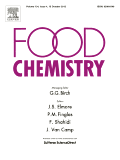
Food Chemistry
Pioneering Research in the Heart of Food ScienceFood Chemistry, published by Elsevier Science Ltd, is a leading international journal dedicated to the publication of high-quality research in the field of food chemistry. Established in 1976, this journal has made a significant impact in its realm, with an impressive 2023 impact factor and ranked Q1 in Analytical Chemistry, Food Science, and miscellaneous Medicine categories. It currently holds a remarkable Scopus ranking of #3 in Analytical Chemistry and #11 in Food Science, signifying its relevance and prestige among the top scholarly publications. With a wide scope that includes the chemistry of food composition, flavor, and safety, Food Chemistry serves as an essential resource for researchers, professionals, and students alike, offering insights and advancements in food analysis and technology. Access options may vary, and the journal is committed to disseminating innovative findings to foster knowledge and application in the dynamic field of food science.

Applied Food Research
Transforming Research into Real-World SolutionsApplied Food Research, published by Elsevier, is an esteemed journal that plays a critical role in advancing the field of Food Science. With an ISSN of 2772-5022, the journal has established itself as a premier outlet for high-quality research, achieving a commendable Q1 ranking in the 2023 Food Science category and a 63rd percentile in Scopus rankings for Agricultural and Biological Sciences. Covering a diverse range of topics from food safety to innovative processing techniques, Applied Food Research seeks to publish pioneering studies that enhance our understanding of food systems and contribute to broader discussions on sustainability and nutrition. As it converges on its fourth year of publication, researchers, professionals, and students alike are encouraged to engage with its content through various open access options, ensuring widespread dissemination of knowledge in a field that is vital to global health and well-being. Operating out of Amsterdam, Netherlands, this journal is poised to be an indispensable resource for anyone dedicated to making significant contributions in the domain of food science.
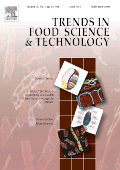
TRENDS IN FOOD SCIENCE & TECHNOLOGY
Advancing food innovation through rigorous research.Trends in Food Science & Technology, published by Elsevier Science London, stands as a premier journal in the fields of food science and biotechnology. With an impressive Q1 ranking in both the food science and biotechnology categories, it is recognized for its rigorous peer-reviewed articles that advance knowledge and innovation in the sector. The journal’s Scopus rankings validate its significance, placing it in the top percentile among its peers, with a remarkable rank of #2 out of 389 in Agricultural and Biological Sciences - Food Science, and #4 out of 311 in Biochemistry, Genetics, and Molecular Biology - Biotechnology. Since its inception in 1990, the journal has become a vital resource for researchers, professionals, and students alike, offering insights into contemporary challenges and trends impacting food technology. Although it operates under a subscription model, the quality of research published within its pages makes it an essential read for anyone involved in advancing the science of food.

FOOD TECHNOLOGY AND BIOTECHNOLOGY
Innovating Solutions for Sustainable Food ProductionFOOD TECHNOLOGY AND BIOTECHNOLOGY is a distinguished peer-reviewed journal published by the Faculty of Food Technology and Biotechnology, University of Zagreb, Croatia. Since its inception in 1993, this Open Access journal has become a crucial platform for disseminating innovative research in the fields of food science, biotechnology, and chemical engineering. With a commendable impact factor and consistent Q2 and Q3 rankings across multiple categories—including Biotechnology, Food Science, and Industrial Engineering—this journal not only fosters academic discussions but also addresses real-world challenges in food production, safety, and sustainability. As it converges its thematic scope from 1996 to 2024, FOOD TECHNOLOGY AND BIOTECHNOLOGY remains committed to advancing knowledge through high-quality research and interdisciplinary collaboration, making it an essential resource for researchers, professionals, and students seeking to stay at the forefront of food innovation and biotechnology.